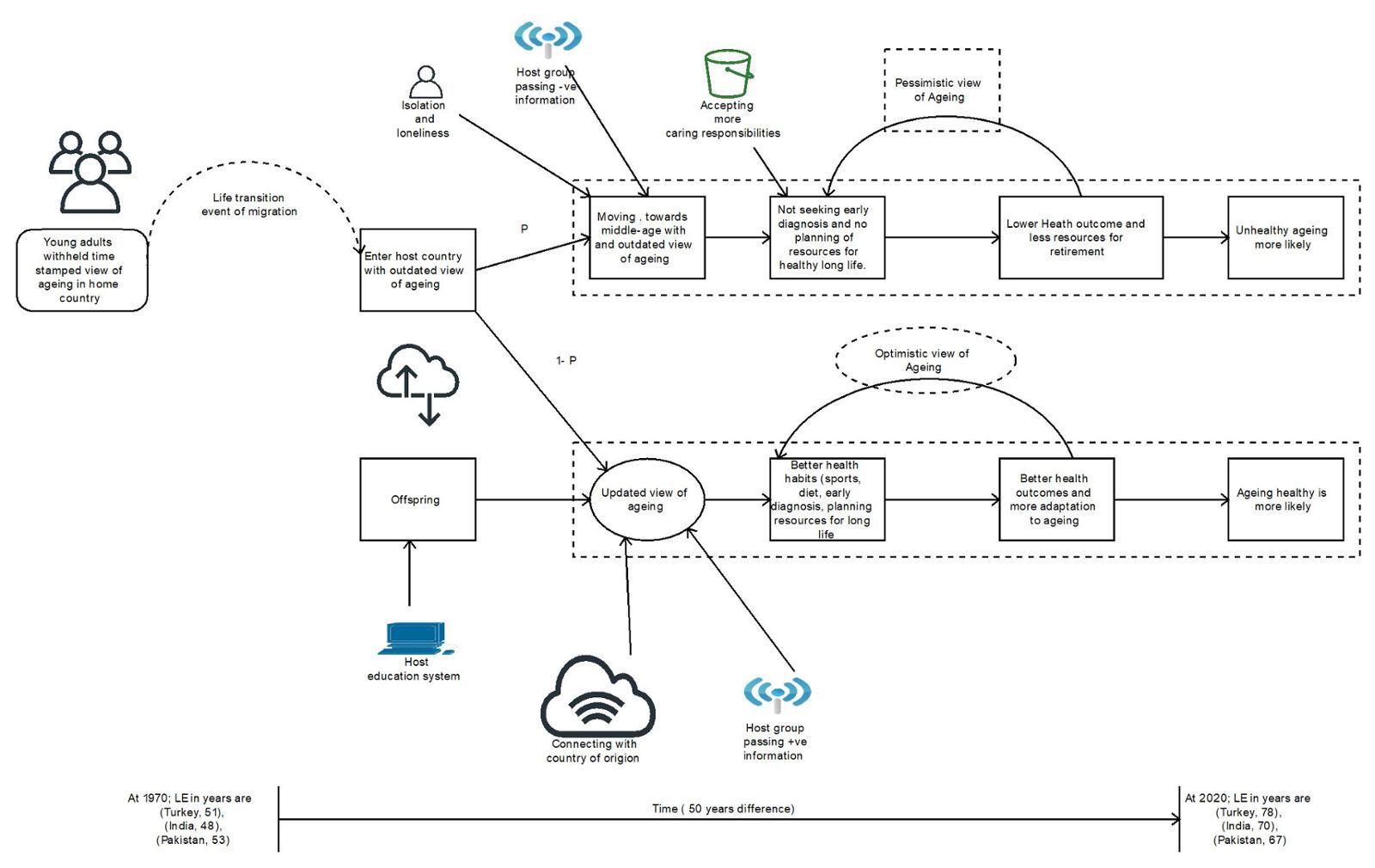In 2021, I wrote a blog on how the way we view ageing may be a pivotal determinant regarding some older migrants’ health, when living in host societies. The question of why older ethnic minority migrants who have for many years resided in the UK may have poorer health outcomes compared to their newly-arrived migrant counterparts, is not adequately addressed in the literature. In the intervening two years since my first post, I conducted research to investigate this further. The aim was to examine how negative portrayals of ageing are formed and how they may be addressed in order to reduce health inequalities for older adults living in countries with sustainable healthcare systems. In doing so, the study delved into the intricate interplay between migration, social contacts, and the adoption of healthy ageing behaviours, among older migrant groups living in the UK. A previous blog post summarised the study’s key findings (fuller details are publicly available here). This blog post aims to provide a summary of my study’s outcomes.
The findings demonstrate the importance of ageing perceptions on health outcomes among older migrants, however, they also highlight additional factors for consideration. Contrary to a common assumption, older adults from low-and middle-income countries have considerably lower social contact rates with other age groups (as well as their own age group), than the non-migrant UK population. The study demonstrates that these disparities can have severe implications concerning health inequalities and are likely to conflict with some migrants' own, often outdated, view of ageing.[1] Our ageing journey is an expedition influenced by cultural norms, societal perceptions, and personal experiences. This already complex matrix becomes even more marked when one explores the ageing process through the lives of migrants.
Shaping Views of Ageing
The debate around healthy ageing definitions add another layer to an already complex situation. This is because the traditional emphasis on functional independence might act to disguise the importance of intrinsic capacity, which is shaped by the interaction between individual capabilities and environmental factors. My study aligns with the World Health Organisation's (WHO) call for changing perceptions toward ageing and underscores the need for culturally specific interventions.
A starting point for my investigation was to acknowledge the foundational role of perception on an individuals' behaviour. Ageing, viewed through the lens of time and cultural context, often manifests differently for older migrants who moved from their countries of origin to the UK and other parts of Europe, during the 1960s. Two central themes are crucial here: the perception of life expectancy and the impact of health-related information and habits ingrained during youth. It is well established that genetics and environmental factors are intertwined and that such entanglement is a determinate of longevity and health outcomes. However, the lens through which one sees one's ageing process is also shaped by societal norms, which directly affect health including engaging in health-promoting behaviours and preventative interventions. In the Middle East, for instance, showing respect for older people includes relieving them of everyday physical activities like shopping, cooking, and housework. This way of thinking, although well-intentioned, may inadvertently contribute to adverse health implications which are linked to a lack of physical and cognitive engagement in day-to-day tasks.
The Evolutionary Journey
The conceptual framework of my study draws on a range of sources, including the Dahlgren and Whitehead model of health determinants, the WHO’s global strategy on ageing, and the Multidimensional, Ecological, and Comparative Approach (MECA) for understanding migrants' life cycles. The Figure[i] below depicts migrants' potential divergence when adopting either outdated or updated views of ageing, post-migration.
Pathway 1 suggests a problematic trajectory, where structural factors combined with social isolation hinder integration with the host population. This group is more likely to retain an outdated view of ageing, shaped by their home country's norms and practices. Conversely, Pathway 2 demonstrates positive assimilation, with migrants updating their views based on positive experiences in the host country.

A Glimpse into Social Dynamics
The study takes a comprehensive approach, leveraging insights from Diffusion of Innovation Theory to explore how social connections impact the adoption of healthy ageing practices among older migrants. It addresses the dynamics of social connectivity and the diffusion of innovation by meticulously integrating various data sources and methodologies within a mathematical modelling framework for the diffusion of innovation. At its core, a deterministic model is used to examine the adoption of innovation within a population over time. Individuals within this population are categorized as either adopters or non-adopters. The model describes the progression of the proportion of individuals who become adopters, providing insights into the dynamics of innovation adoption, capturing the pattern of gradual uptake, reaching a peak, and eventually stabilizing. The data used is from publicly available surveys and other relevant studies to focus on migrants who moved from India, Pakistan, and Turkey to the UK.
The primary objective was to uncover how the social fabric influences older migrants' engagement with healthy ageing practices. This multifaceted approach offers a nuanced understanding of the interplay between social dynamics and innovation acceptance. Ultimately, it sets the stage for insightful conclusions regarding potential disparities in healthy ageing practices among different demographic groups. The diffusion model employed in the study provides insights into the gradual uptake of innovation within ethnic-diverse populations. It describes the trends of adapting health innovations over time, considering the influence of internal and external factors.
The findings suggest that older migrants are often prone to outdated views of ageing due to reduced social contacts and the challenges migration brings. The risk of social isolation looms large for this group, strengthened by a prevalent lack of trust in health research among ethnic minorities.
Outdated Views and Health Outcomes
The views of ageing among older migrants, particularly those who migrated in the early 1970s, might be due to decades-old perspectives. These views were shaped during their upbringing in their countries of origin. It is also likely that the rapid increase in life expectancy globally, especially in developing countries, creates confusion for some migrants who have not witnessed these changes first-hand. These additional unplanned years, and their lack of integration within the host majority, do not help.
For some older migrants, the combination of potentially outdated perceptions, the stressors of migration and limited social contacts, and structural factors such as discrimination and racism, form a complex web that impacts health outcomes. The study suggests that these factors may interact and contribute to adverse health impacts as individuals become less likely to engage in health-promoting behaviours and/or plan for their later years.
Conclusion:
In essence, the study reflects on the interaction between migration, social contacts, Diffusion of Innovation Theory and perceptions of ageing. It calls for culturally aware targeted interventions that account for a potentially slower diffusion of innovation among older migrants. In addition, it calls for ways to communicate healthy ageing behaviours to younger migrants, the groups with higher social contact rates. Public health authorities may also seek to bridge the gap by actively involving migrants in early stages of health research and dissemination by including them in the design of research questions and priorities. Building trust, particularly among ethnic minorities, becomes a prerequisite to increasing the uptake of public health innovations. This holistic approach, accounting for cultural nuances and social dynamics, paves the way for a more inclusive and sustainable healthcare system.
[1] Outdated here is a matter of perspective. For older adult migrants, their views concerning ageing may be contemporaneously valid, however, compared to the standpoint of their younger counterparts they might appear outdated. That notwithstanding, research on ageing has advanced and it is now widely accepted that physical activity and positive perceptions of ageing are key health determinants.
[i] Ismail, M. (2023). The Effect of Social Contacts on the Uptake of Health Innovations among Older Ethnic Minorities in the UK: A Mixed Methods Study. Sustainability, 15(14), 10839. Available at: https://doi.org/10.3390/su151410839
Opinions of the blogger is their own and not endorsed by the Institute
Comments Welcome: We welcome your comments on this or any of the Institute's blog posts. Please feel free to email comments to be posted on your behalf to administrator@ageing.ox.ac.uk or use the Disqus facility linked below.













